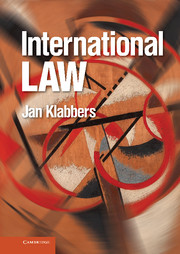Book contents
- Frontmatter
- Contents
- Detailed table of contents
- Table of cases
- Preface
- List of abbreviations
- Part I The structure of international law
- Part II The substance of international law
- Part III The surroundings of international law
- 16 Domestic courts and their relationship with international law
- 17 The politics and ethics of international law and global governance
- 18 By way of conclusion
- Bibliography
- Index
- References
17 - The politics and ethics of international law and global governance
from Part III - The surroundings of international law
- Frontmatter
- Contents
- Detailed table of contents
- Table of cases
- Preface
- List of abbreviations
- Part I The structure of international law
- Part II The substance of international law
- Part III The surroundings of international law
- 16 Domestic courts and their relationship with international law
- 17 The politics and ethics of international law and global governance
- 18 By way of conclusion
- Bibliography
- Index
- References
Summary
INTRODUCTION
The previous chapter suggested that much international law activity takes place within states, before domestic courts or before domestic administrative agencies. International law may be made between states (and within international organizations), but is often given legal hands and feet through domestic law, either by direct incorporation, or through transformation in domestic law.
In much the same way as international law and domestic law are interconnected, so too is international law inextricably tied to its normative and sociological environment. It can confidently be stated that there are close connections between international law, politics and ethics, and that international law and global governance stand in some relationship to each other. International law may have some autonomy vis-à-vis politics and ethics, but its autonomy is generally considered to be relative; it would be difficult to fully comprehend international law in isolation from both politics and ethics. This chapter aims to flesh out some of the interrelations at stake here, and in doing so takes up some themes already touched upon in Chapter 1 above.
- Type
- Chapter
- Information
- International Law , pp. 304 - 314Publisher: Cambridge University PressPrint publication year: 2013



